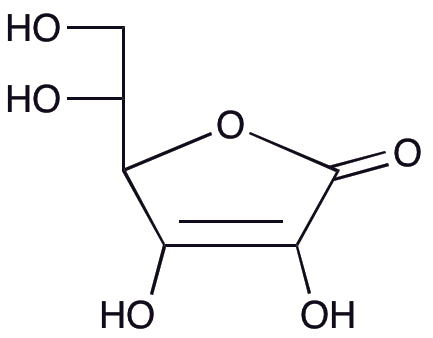D-(-)-Isoascorbic acid is widely utilized in research focused on:
- Food Preservation: This compound acts as a powerful antioxidant, helping to prevent oxidation in food products. It is commonly used in the food industry to extend shelf life and maintain the quality of fresh produce and processed foods.
- Cosmetic Formulations: Due to its antioxidant properties, it is incorporated into skincare products to protect against free radical damage, promoting healthier skin and reducing signs of aging.
- Pharmaceutical Applications: It serves as a stabilizing agent for various medications, enhancing their efficacy and ensuring longer shelf life, particularly in formulations sensitive to oxidation.
- Research in Nutrition: This compound is studied for its potential health benefits, including its role in collagen synthesis and its impact on immune function, making it relevant in nutritional research.
- Analytical Chemistry: D-(-)-Isoascorbic acid is used as a standard in various analytical methods to measure vitamin C levels in food and biological samples, providing accurate and reliable data for researchers.
General Information
Properties
Safety and Regulations
Applications
D-(-)-Isoascorbic acid is widely utilized in research focused on:
- Food Preservation: This compound acts as a powerful antioxidant, helping to prevent oxidation in food products. It is commonly used in the food industry to extend shelf life and maintain the quality of fresh produce and processed foods.
- Cosmetic Formulations: Due to its antioxidant properties, it is incorporated into skincare products to protect against free radical damage, promoting healthier skin and reducing signs of aging.
- Pharmaceutical Applications: It serves as a stabilizing agent for various medications, enhancing their efficacy and ensuring longer shelf life, particularly in formulations sensitive to oxidation.
- Research in Nutrition: This compound is studied for its potential health benefits, including its role in collagen synthesis and its impact on immune function, making it relevant in nutritional research.
- Analytical Chemistry: D-(-)-Isoascorbic acid is used as a standard in various analytical methods to measure vitamin C levels in food and biological samples, providing accurate and reliable data for researchers.
Documents
Safety Data Sheets (SDS)
The SDS provides comprehensive safety information on handling, storage, and disposal of the product.
Product Specification (PS)
The PS provides a comprehensive breakdown of the product’s properties, including chemical composition, physical state, purity, and storage requirements. It also details acceptable quality ranges and the product's intended applications.
Certificates of Analysis (COA)
Search for Certificates of Analysis (COA) by entering the products Lot Number. Lot and Batch Numbers can be found on a product’s label following the words ‘Lot’ or ‘Batch’.
*Catalog Number
*Lot Number
Certificates Of Origin (COO)
This COO confirms the country where the product was manufactured, and also details the materials and components used in it and whether it is derived from natural, synthetic, or other specific sources. This certificate may be required for customs, trade, and regulatory compliance.
*Catalog Number
*Lot Number
Safety Data Sheets (SDS)
The SDS provides comprehensive safety information on handling, storage, and disposal of the product.
DownloadProduct Specification (PS)
The PS provides a comprehensive breakdown of the product’s properties, including chemical composition, physical state, purity, and storage requirements. It also details acceptable quality ranges and the product's intended applications.
DownloadCertificates of Analysis (COA)
Search for Certificates of Analysis (COA) by entering the products Lot Number. Lot and Batch Numbers can be found on a product’s label following the words ‘Lot’ or ‘Batch’.
*Catalog Number
*Lot Number
Certificates Of Origin (COO)
This COO confirms the country where the product was manufactured, and also details the materials and components used in it and whether it is derived from natural, synthetic, or other specific sources. This certificate may be required for customs, trade, and regulatory compliance.


